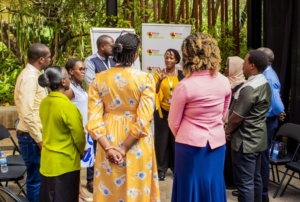The imperative of radical collaboration in complex times

Latest posts
Share:
Collective problems need collective action. Collaborations are not accidents of timing and serendipity. They need careful crafting to address the challenges we face today.
In our era of complexity we need ways of working together that span traditional boundaries.
Ehrlichman
Human history is punctuated by the tension between collaboration and competition. The historian Niall Ferguson argues that while competition drives innovation and efficiency it is collaboration that enables us to exponentially accelerate knowledge, exchange ideas, pool resources and tackle shared goals.
And yet collaboration is often hard to do. The competitive desire to protect knowledge, control activities, get ahead and go fast all favour ‘going it alone’. But some problems simply cannot be solved alone; they will only give in to the collective action and collective creativity that is unleashed when we collaborate. Whether it is a food and drink company trying to manage its waste responsibly; the need to offer banking services to the unbanked, the battle to bring down greenhouse gas emissions, the future of work in an AI powered world or any other of a myriad sustainability challenges, we can only solve these if we collaborate.
Often collaboration can seem like an accidental by-product of timing and serendipity. But scratch below the surface and there was often pain staking and intentional work to build the conditions that allowed for the eruption of creativity and action that we see.
Know what you are collaborating for
Collaborating takes commitment and effort. None of us will sustain this just because we think we ought to, or because it is a good thing to be seen to do.
Collaboration happens when we know we cannot go it alone (probably because we have already tried and failed). It happens when we know, be it individually or institutionally, that our ability to succeed is locked with the choices, actions and success of others.
So, for a collaboration to sustain we must know what we are together acting upon. We may disagree on the causes of the problem, and almost certainly on how to tackle it and we may have different reasons for addressing it, but we need to have a shared problem to solve or opportunity to grasp.
For example, as we have seen in our work, when national governments, agri-business and civil society collaborate to tackle poverty amongst smallholder famer incomes there are different agendas at work. Corporate interests may be well-meaning but they are also concerned about vulnerable supply chains as young people move away from farming and seek better incomes elsewhere.
Government wants to tackle poverty, drive economic growth and perhaps has concerns about civil unrest. Meanwhile, civil society groups seek to advocate for the rights of often the most marginalised. These different agendas do not make for comfortable or aligned action, but all parties know they cannot progress their agenda alone, they know they are interdependent.
Different agendas and needs will be at work, be explicit about these, and know that progress will depend on everyone meeting just enough of their own agenda.
Be ready to compromise
We love the idea of collaboration – often because we assume it means other people or organisations will support our agenda. But complex problems are experienced differently by different people. And organisations have different agendas and constituents they need to serve. And so, with complex problems agreement and alignment can be hard to find.
It is a myth to think that with enough data and enough talking a single understanding and a single solution can be found. Rather collaborations need to find ways to work together despite differences of view and even disagreement. And this is only possible with sometimes uncomfortable compromises.
Of course, for all of us there are compromises that ask us to go too far, those we cannot make – and so there will be people and organisations with whom we cannot collaborate. But any collaboration will require some form of compromise, you may need to hold a long-term justice goal more lightly in order to achieve a short-term improvement, or perhaps there are additional costs your business will need to internalise or scrutiny you will need to open up to.
Maybe you will have to organise yourselves in ways that feel unfamiliar or learn to value different things as you seek to combine social impact goals with commercial pressures.
Collaborations allow us to achieve different things but that demands, whoever we are, that we work in different ways.
Embrace systems leadership
Inter-organisational collaborations are not like running a project team. There is often no clear ‘boss’, there is a lot of discretionary effort at work, there are explicitly different agendas and parties will ‘own’ resources that everyone needs access to. Working together in these conditions cannot be driven by traditional command and control leadership. The normal modes for assigning accountability are unlikely to work.
Instead, there needs to be leadership focused on relentlessly creating the conditions for collaboration. These include: building the network of relationships between parties, a focus on the collective vision that holds people and institutions together, shared credit for what is achieved and a valuing of the diverse agendas and landscapes inside the collaboration.
Collaboration may be hard; at times it may feel slow; it may ask us to imagine new ways of leading and working together (or resurrect much older ones), but if we are going to tackle the climate and biodiversity crisis, meet the challenges of an AI-driven future of work, navigate accelerating polarisations then we cannot work alone.










